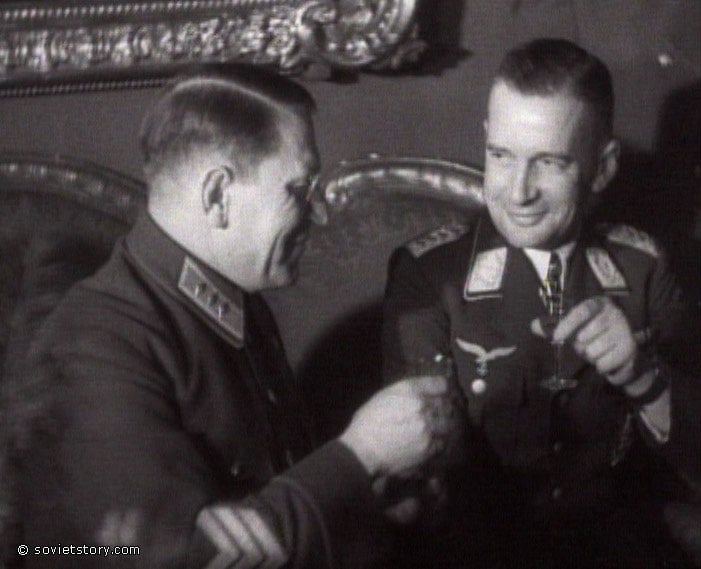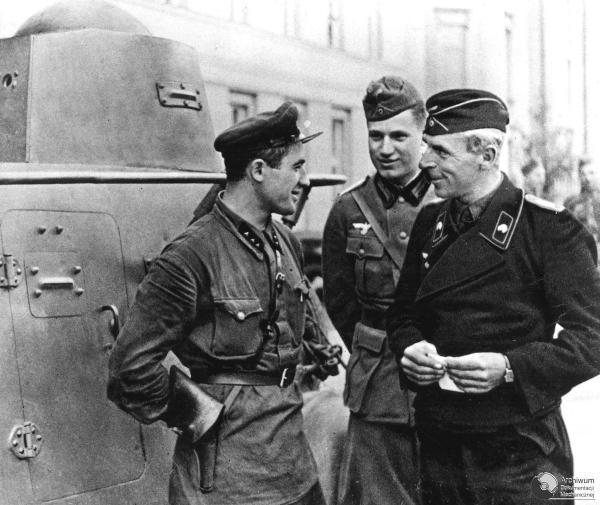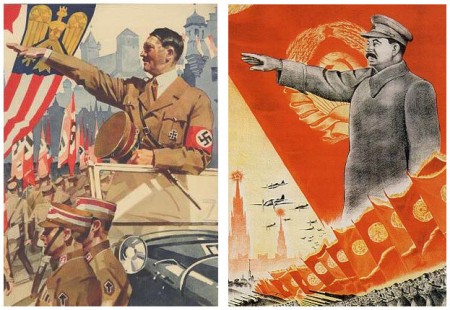Here you can read the second part of Brian Bryttan about Russian Propaganda against Ukraine. The original article can be found here. Also, you can already read the first part.
How Russia ‘fought against fascism’ – from 1920 until 1941
For more than twenty years, Moscow’s closest ties in Europe were with Germany – starting in 1920 when Berlin supplied intelligence about the Polish Army to the Soviets. (And twenty years later, Stalin returned the favor when he had his radio stations in Minsk broadcast signals to the Luftwaffe to guide them to their Polish targets.) Everyone now knows about the secret 1939 Nazi-USSR Molotov-Ribbentrop Treaty, but even as late as October, 1940, Stalin was still negotiating terms to join the Tripartite Pact with Italy, Japan, and Germany.
Karl Radek, fervent Stalinist and one of the authors of the new Soviet Constitution, wrote
“… only fools could imagine we should ever break with Germany… No one can give us what Germany can.”
Berlin needed oil, manganese, wheat – while Moscow needed machine tools, military materials, and equipment for their chemical industry. Soviet-Nazi collaboration extended past economic and into military cooperation, involving such firms as Krupp, Rheinmetall, Junkers aircraft , Walther firearms, and I.G. Farben for toxin chemical research.
Illegal Nazi-Soviet joint military operations were secretly conducted on Soviet territory during inter-war years. They included:
– Nazi-Soviet tank school at Kama, near Kazan
– Nazi-Soviet pilot training school at Litebsk
– Junkers fighter-plane plants at Fili (the largest enterprise of its time)
– Nazi-Soviet War poison gas and mists plants in Tomka, near Samara
Hoping to improve his relations with Hitler, Stalin returned to Germany Jews who had come to the Soviet Union expecting the promised ‘worker’s paradise’ . For their part, Nazi officers visited Soviet concentration camps to study how the Russians handled a common concern.

A fascist by any other name…
While still in bed with Hitler, Stalin annexed the Baltics, tore apart Poland and started a war with Finland. Why is this not ‘fascist’ if the Nazis were doing the same thing? And then, did Stalin’s subsequent horrendous acts suddenly stop being ‘fascist’ once Hitler became his enemy?
Back in 2008, Dr. Andreas Umland wrote that describing Russia as ‘drifting to fascism’ was “…crying wolf too early”. Significantly, he went on to add that in assessing Russia’s fate today and in the next years “we should reserve the label ‘fascist’ for only those that indeed deserve this most value-laden term of the 20th century.”
Most value laden?… Are some labels more equal than others?
So just why should we elevate ‘fascism’ to a preeminent position? After all, history is full of horrific cruelties and injustices. And Dr. Umland’s “most value-laden” F-word has served Russia very well for numerous pretexts, including its present invasion of Crimea.
Originally applied to Mussolini, ‘Fascism’ was used to describe a radical authoritarian nationalism. But why should it matter who does it – someone from the ‘right’, from the ‘left’ or little green men in Crimea?
The same media who repeat talking points about “fascism” in today’s Ukraine, never mention the millions of Ukrainians who gave their lives fighting both ‘fascist’ Nazis and their former allies – the Soviets.
(Actually, the Soviets even got the label wrong when they started using it against Hitler. Perhaps if they had correctly defined the Germans as National Socialists (Nazis), the realization that their enemy were also Socialists would have struck a nerve?)
Right Sector and Svoboda party
The two most often attacked Ukrainian organizations are the Right Sector and the Svoboda party. Both Svoboda and Right Sector are very minor players on the current political landscape and have no realistic hope of any significant role in the coming government.
The leader of the Right Sector is Dmytro Yarosh, born and raised in the predominantly Russian speaking south-eastern city of Dniprodzerzhinsk. Yarosh was a member of the Young Pioneers and the Countrywide Leninist Communist Youth League and served two years in the Soviet Army. One of the key forces during the Kyiv Revolution, the Right Sector has many Russian speaking members and has not been associated with any ‘fascist’ or anti-Jewish statements. In his first foreign interview, Yarosh told TIME that while the revolution needs to steer the country into a new direction, not dependent on either the West or East, he understands that any new opposition government is not likely to carve out a place for him and his men.
The Svoboda party was established in 1991 but only within the last four years attained a noticeable profile. Both Svoboda and Right Sector are very minor players on the current political landscape and have no realistic hope of a major role in the coming government. Svoboda members have recently bullied a TV journalist. Svoboda formally says it is not anti-European, nor anti-Russian, nor anti- Jewish but pro-Ukrainian.
Actually, the ‘anti-Semitic’ theme is now being played by Moscow at low volume ever since the chief Rabbi of Ukraine, seconded by every major Ukrainian Jewish organization, issued statements categorically affirming the freedoms Jews have in Ukraine and supporting the new Kyiv government. There are no instances of any Human Rights Watch organization reporting either Jewish or Russian “persecution” in Ukraine.
What the West does not understand about the “right”-ist groups in Ukraine is that they are here because the anti-Imperialist battle is not over, and they are not that frightening. They are certainly not saying “ban all foreigners…or Russians… or Jews” like Right groups in other European countries. What they are saying is it is time to save their culture and society which the Russians destroyed.
it is important to appreciate the reasons why the Svoboda party emerged on the scene so recently. First, they capitalized on the vacuum created when the “Rukh” movement (Yushchenko’s party) started to disappear after Yanukovych’s election. And perhaps more significantly, both Right Sector and Svoboda were part of a nation-wide uprising against the unprecedented centralization and isolation of Yanukovych’s government, under which the entire judicial system had for all intents disappeared, and the entire country was engaged in a deathly struggle with the criminal government.
Once a story gets out, the damage is done.
Today, TV commentators act as if they own this label. CNN ‘experts’ recently took umbrage at comparisons between Putin’s and Hitler’s Crimean and Czechoslovakian adventures. All three commentators were quick to point out Putin had not killed 6 million Jews, nor had he started a world war, so how dare anyone call him a fascist? And yet the very same media regularly labels “fascist” elements in Ukraine (Prof. Steven Cohen called the Kyiv Maidan a ‘fascist rabble’ on CNN).
Commentators from the West who pride themselves on their own Diversity and Tolerance, concluded for viewers that 60% Russian-speakers should de facto have a choice for separation of Crimea – (no one seemed to care what would happen to the remaining 40% of non-Russians). Are the ‘experts’ implying that poor dumb Slavs are just not up to the same Western ideals of diversity which their own, more enlightened nations live by? And how condescending, if not outright racist of the media to suggest that?
Once it’s put out there, the damage is done. On March 3 Chritiane Amanpour confrontedCNN’s Wolf Blitzer for his unstudied ‘report’ repeating Russian Ambassador Churkin’s claims that “fascists and anti-Semites” were to blame for Ukraine’s unrest. Mr. Blitzer justified himself that he was merely ‘reporting’ someone else’s statement – but did not issue any correction for the record.
Words have meanings, and labels have consequences. However, when we create a hierarchy of values, and attach a greater emotional significance to terms like “fascism” – this often leads to an automatic reflex, selective outrage and muddies the waters – rather than an honest look.
Hollywood still keeps cranking out dozens of films about Hitler and the Nazis, but when was the last time you saw a movie about Stalin or any of the horrors under the Soviet Union?
Part 1 examined how the term ‘fascist’ has become almost meaningless today, how Russian ‘antifascists’ are the real ‘fascists’ and anti-Maidan propaganda.
By Adrian Bryttan, March 21, 2014






